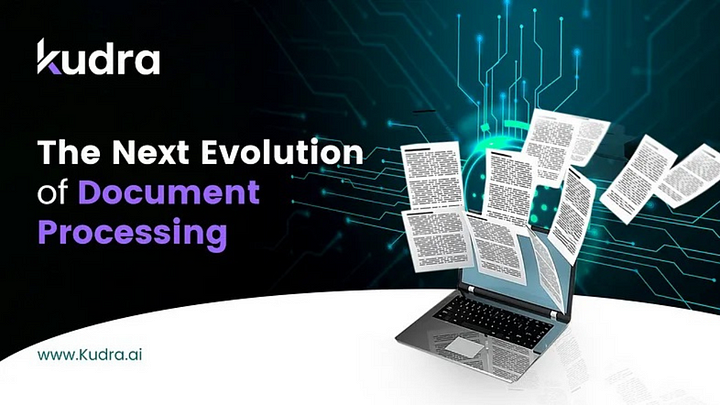Transforming Document Processing in the Legal Industry with Kudra
Legal
Automation
AI
Legal Tech
Document processing
10 min read · Sept 19th, 2023

In the fast-paced and demanding world of the legal industry, managing documents efficiently and accurately is crucial for success. However, traditional document processing methods have often been time-consuming, error-prone, and costly. With the advent of automated document processing, powered by advanced technologies such as artificial intelligence (AI) and machine learning (ML), the legal industry is experiencing a transformative shift.
In this article, we will explore the pain points of document processing in the legal industry, the benefits of automated document processing, and how Kudra can transform the way legal professionals work.
The Pain Points of Document Processing in the Legal Industry

The legal industry has long been plagued by several pain points when it comes to document processing. These challenges include:
Time-consuming manual processes: Legal professionals spend a significant amount of time on administrative tasks, including document review and research. This not only hampers productivity but also leads to delays in case proceedings.
Inefficiency and errors: Manual document processing is prone to human errors, such as typos, incorrect formatting, and data entry mistakes. These errors can have serious implications for legal documents, leading to potential legal disputes and costly consequences.
Lack of standardization: Different legal professionals may have different approaches to document processing, resulting in inconsistencies and lack of standardized practices within firms. This can lead to confusion, inefficiencies, and increased risk.
Limited accessibility and collaboration: Traditional document processing methods often involve physical paperwork or locally stored digital files, making it difficult for multiple stakeholders to access and collaborate on documents. This hampers efficient teamwork and slows down decision-making processes.
How Automated Document Processing Can Help

Automated document processing, leveraging AI and ML technologies, offers a range of benefits that address the pain points of the legal industry. These benefits include:
1. Enhanced Efficiency and Productivity
Automated document processing significantly reduces the time and effort required for manual tasks such as document review, data extraction, and categorization. AI-powered algorithms can quickly analyze and extract relevant information from large volumes of documents, allowing legal professionals to focus on higher-value tasks. By streamlining document processing workflows, firms can improve productivity and handle a larger workload with greater efficiency.
2. Improved Accuracy and Compliance
Human errors in document processing can have serious consequences in the legal field. Automated document processing tools, with their advanced algorithms, can achieve a high level of accuracy in extracting and analyzing information from legal documents. This reduces the risk of errors and ensures compliance with legal regulations and requirements. By minimizing the margin of error, firms can enhance the quality and reliability of their document processing workflows.
3. Standardization and Consistency
Automated document processing enables firms to establish standardized practices and workflows for document creation, review, and management. Templates and predefined rules ensure consistency in document formatting, language, and content. This not only reduces the risk of errors but also creates a cohesive and professional image for the firm. Standardization also facilitates easier collaboration among team members and seamless sharing of documents within the firm.
4. Increased Accessibility and Collaboration
Cloud-based automated document processing solutions enable easy access to documents from anywhere at any time. This promotes remote collaboration, allowing legal professionals to work together seamlessly regardless of their physical location. Real-time collaboration features, such as version control and document sharing, enhance teamwork and streamline decision-making processes. Legal professionals can access and edit documents simultaneously, ensuring efficient collaboration within the firm and with clients.
5. Cost Savings and Resource Optimization
Automated document processing reduces the need for manual labor, resulting in cost savings for law firms. By automating repetitive and time-consuming tasks, firms can allocate their resources more efficiently. Legal professionals can focus on higher-value and complex legal work, while routine document processing tasks are handled by AI-powered tools. This optimization of resources leads to improved profitability and a competitive edge in the legal market.
Real-World Applications of Automated Document Processing in the Legal Industry

Automated document processing solutions are already being adopted by law firms around the world, transforming their document workflows and enhancing their efficiency. Here are some real-world applications of automated document processing in the legal industry:
1. Contract Analysis and Review
Contract analysis and review processes can be time-consuming and prone to errors. Automated document processing tools can extract key terms, clauses, and information from contracts, enabling faster and more accurate analysis. These tools can also flag compliance issues and identify changes made to the original document, facilitating smoother contract negotiations and reducing the risk of disputes.
2. Legal Research and Due Diligence
Automated document processing can assist legal professionals in conducting comprehensive legal research and due diligence. By leveraging AI algorithms, these tools can analyze vast databases of case law, statutes, and legal precedents, providing researchers with valuable insights and summaries. This not only saves time but also ensures that legal professionals have access to up-to-date and relevant information for their research.
3. E-Discovery and Litigation Support
E-discovery and litigation support processes involve the identification, collection, preservation, review, and production of electronically stored information. Automated document processing tools can expedite these processes by automatically categorizing and organizing documents, as well as identifying relevant information within large volumes of data. This significantly reduces the time and costs associated with e-discovery and litigation support, enabling legal professionals to build stronger cases more efficiently.
4. Client Onboarding and Compliance
Client onboarding is a critical process in the legal industry, requiring firms to gather and verify client information while ensuring compliance with regulatory requirements. Automated document processing tools can streamline this process by efficiently processing compliance documentation, such as Know Your Customer (KYC) and Anti-Money Laundering (AML) documents. These tools can verify client identities, conduct background checks, and ensure compliance, enhancing the client onboarding experience while reducing the risk of regulatory violations.
Introducing Kudra: AI Document Processing Solutions for Legal Industries

One such groundbreaking solution for document capture and processing is Kudra, an innovative platform designed to revolutionize document management within the legal industry. Kudra’s extensive array of features is meticulously crafted to cater to the distinctive challenges and needs of legal professionals, including Optical Character Recognition (OCR), table extraction, Form Recognizer, Large Language Models (LLMs), and versatile export options.
Let’s delve into how these features specifically cater to optimizing efficiency and precision in the legal sector:
OCR (Optical Character Recognition):

- OCR technology plays a pivotal role in the legal industry by extracting text from documents like contracts, litigation records, and case files with unparalleled accuracy.
- It eliminates the need for labor-intensive manual data entry, effectively minimizing errors and ensuring the highest level of document precision.
- OCR also transforms physical legal documents, such as court pleadings or legal agreements, into digital formats, making it effortless to search for and retrieve essential information.
Table Extraction :
- Simplifies table extraction in legal documents, containing vital case details and financial information.
- Converts tabular data into a structured digital format, improving data organization and accessibility.
- Enables legal professionals to efficiently handle tables within a digital environment, thereby enhancing overall document management.
Form Recognizer:
- Form Recognizer capabilities hold exceptional value for legal documents by automatically categorizing elements like case types, legal provisions, and contractual clauses.
- This functionality streamlines the sorting and organization of legal documents, reducing manual effort and expediting legal processes.
- Legal practitioners can swiftly locate and share pertinent documents, enhancing client interactions and the efficiency of legal proceedings.
LLMs for Precise Classification (Large Language Models):

- Leveraging LLMs ensures meticulous classification of legal documents into categories such as litigation documents, legal agreements, or court filings.
- It enhances document indexing, simplifying access to specific documents within a legal database.
- Precise classification bolsters compliance efforts and expedites document retrieval during legal proceedings.
Flexible Export Options:
- Legal professionals enjoy a variety of export formats, including PDF or JSON, to accommodate diverse requirements.
- These formats facilitate seamless sharing, archiving, and collaboration on legal documents.
- Users have the freedom to select the format that best aligns with their needs, whether for client presentations, regulatory compliance, or archival purposes.
Kudra’s Customized Document Processing Solutions Tailored for the Legal Industry
While Kudra offers a comprehensive suite of powerful features designed to boost operational efficiency, what truly distinguishes it is its unmatched customization capability. Beyond the features mentioned, Kudra stands out as a solution that can be finely tuned to seamlessly align with the distinct requirements of your legal practice.
Here’s how Kudra empowers legal professionals:
Adapts to Your Practice:
Kudra’s AI technology is not a one-size-fits-all solution; it adapts to the intricacies of the legal field and your unique business processes. This adaptability means that Kudra becomes increasingly efficient and effective as it comprehends the nuances of your legal operations. As it learns from your inputs and interactions, Kudra becomes a trusted partner, helping you save time on routine document-related tasks.
Focus on Core Legal Matters:
By automating document processes, Kudra frees up your valuable time and resources, enabling you to concentrate on the core aspects of your legal practice. You can channel your energy into providing exemplary legal services, strengthening client relationships, and optimizing outcomes for your clients. Kudra’s automation ensures that your document-related workflows are seamlessly managed, allowing you to prioritize strategic decision-making and growth opportunities.
User-Friendly Interface:
Kudra’s intuitive and user-friendly interface empowers you to effortlessly create customized workflows without requiring coding skills. The intuitive drag-and-drop workflow creation feature allows you to adapt Kudra to your specific legal needs. This ease of use ensures that you can tailor document processing workflows to align perfectly with your legal practice, enhancing efficiency without any technical complexity.
AI-Powered Efficiency:
Kudra’s AI capabilities go beyond mere automation; they actively enhance your workflow by learning from your interactions. Each correction, input, or new document type becomes a learning opportunity for Kudra, making it progressively more accurate.
→ Kudra becomes finely tuned to your unique legal practice needs, optimizing efficiency and accuracy.
Kudra’s Advantages Extend Beyond Typical AI Document Processing Solutions
In addition to the advantages mentioned earlier, Kudra elevates efficiency, accuracy, and cost-effectiveness to new heights for legal professionals:
Seamless Integration with Your Preferred Tools:
Kudra seamlessly integrates with a variety of essential tools, such as case management software and legal research platforms. This integration ensures that document processing becomes an integral part of your existing workflow, enhancing overall efficiency within the legal practice.
Achieving an 80% Reduction in Operational Costs and Reducing Human Errors by 95%:
Experience it firsthand — Kudra revolutionizes document processing, reducing manual document work by 90%, thereby freeing up your team to concentrate on value-added legal tasks.
Furthermore, Kudra’s automation significantly reduces human errors by 95%, ensuring consistent and accurate data handling. With an 80% reduction in operational costs, Kudra automates tasks and enhances efficiency, leading to substantial cost savings.
By harnessing the power of Kudra in your legal operations, you can amplify the benefits of document capture and processing, ushering in a new era of efficiency, precision, and cost-effectiveness in the legal industry.
The Future of Document Processing in the Legal Industry

As technology continues to advance, the future of document processing in the legal industry holds even more possibilities. Emerging technologies such as natural language processing (NLP) and advanced data analytics will further enhance the capabilities of automated document processing tools. These advancements will enable legal professionals to extract deeper insights from legal documents, identify patterns, and make more informed decisions.
Additionally, the integration of document processing tools with other legal technologies, such as case management systems and virtual assistants, will create a seamless and interconnected legal ecosystem. This integration will further streamline document workflows, improve collaboration, and enhance overall efficiency in the legal industry.
Conclusion
In conclusion, automated document processing is revolutionizing the way legal professionals handle documents. By leveraging AI and ML technologies, firms can overcome the pain points of manual document processing and achieve enhanced efficiency, accuracy, and collaboration.
As the legal industry embraces these advancements, the future of document processing looks promising, with increased productivity, cost savings, and better client experiences. It is imperative for law firms to embrace and leverage automated document processing to stay competitive and thrive in the digital age.
And if you’re ready to transform your approach to document processing, Kudra stands ready to guide you.
Contact us for a free demo and embark on a journey toward a more efficient, effective, and stress-free document processing experience !